It looks like you're using an Ad Blocker.
Please white-list or disable AboveTopSecret.com in your ad-blocking tool.
Thank you.
Some features of ATS will be disabled while you continue to use an ad-blocker.
share:
Bees are a vital part of our eco-system. They pollinate flowers, trees, plants, and anything with a blossom that requires fertilization to grow.
Bees do that for us. I am a beekeeper, the technical term being an apiarist, and I'd like to share a bit with you about the technical aspects of
beekeeping. It's a pretty big initial investment, but it's something that was taught to me by my grandfather, (god rest his soul since 1981), and
all your equipment and materials are reusable, save occasional wax replacements.
The hive consists of three types of bees: The worker, the drone, and the Queen. The Queen controls the hive by pheromones. The drones are male, and their sole purpose is to mate with the Queen. Many drones will mate with the queen during her once a year mating flight, and if a drone mates with her, they soon die afterwards. Once inseminated, the Queen has enough eggs to lay for 2-3 years. Drones have no stingers, and if honey supplies run low, they are driven from the hive to starve. Useless males, argh!
The vital worker bee, female, of course, who does all the work:
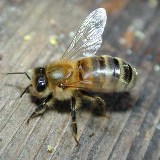
The honeybees you see on flowers are always female. They collect pollen, eat it, and it goes into one of their special stomachs to be convert by enzymes into honey. They regurgitate the interim product into the mouth of another bee once back at the hive, who further processes it. That bee deposits it into a hexagonal comb, then caps it off once full.
When TSHTF, every community should have a few hives. This ensures local crop pollination, and provides a method of sweetening once supplies of sugar run out. I am planning ahead, and perhaps we can barter honey for other needed resources. If nothing else, I'll have a bunch of honey stockpiled, as it never spoils, and I already have a few friends willing to buy a few pounds off of this year's harvest. This year's harvest is estimated at 230 lbs, and we have to extract this weekend, so I'll be doing a follow-up thread depicting the extraction process.
A bit of background info: My father is a Vietnam War vet, a paraplegic due to his service, and his interest in beekeeping is a hobby of his as well. He has Multiple Sclerosis, and is confined to a wheel chair, so we both share advice and keep the hives running. He's 73, and still suits up to tend the bees, yet still catches an occasional bee to sting him, as he heard it was good for his MS.
We had three hives. Here's the video depicting the capture of hive 4, which is the hive furthermost to the rear now. Enjoy! (Note: Swarming bees are the most docile, as they have no hive to protect. My 15 year old daughter got really close to the bees, and never got stung. She's the voice in the video. It's when you threaten their hive that they get nasty.)
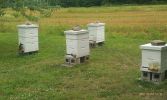
Here's the basics of a hive:
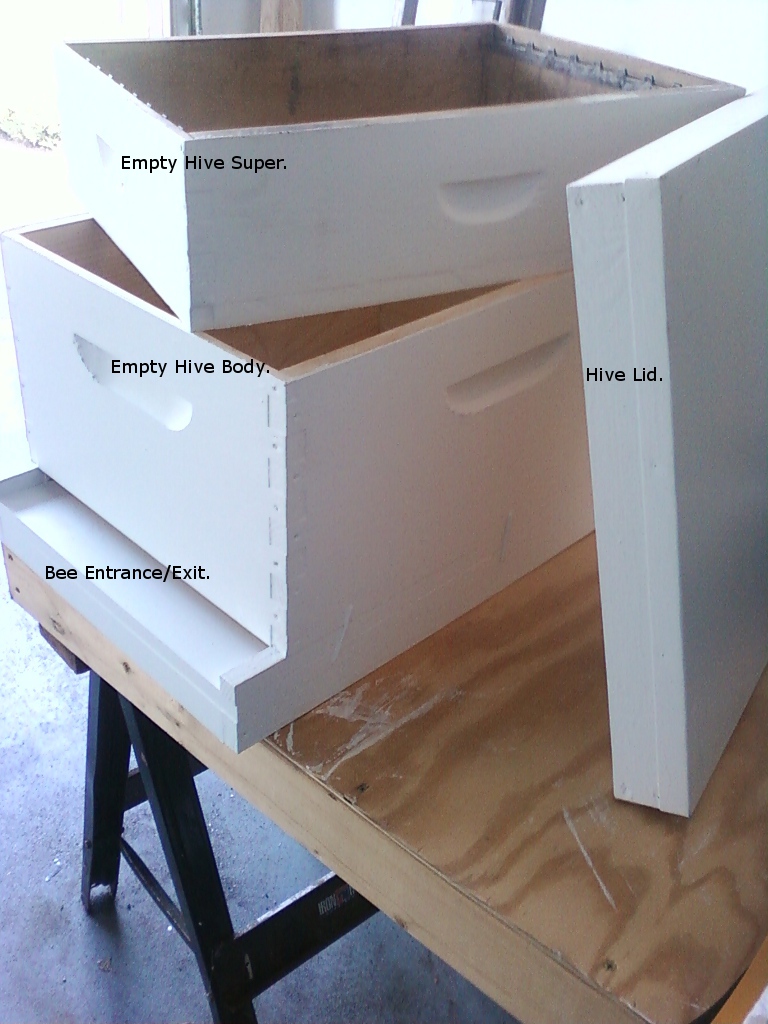
Here's the basic tools you need:

A note about smokers. I rarely use them. Smokers cause the bees to instinctively react to their hive being on fire, and they turn and start gorging themselves on honey. They don't bother you, because they are eating at their hive, but I honestly think that dealing with bees in the right humidity at the right time of day is more beneficial than "stressing" them out. Also, if you notice, beekeepers wear bright clothing, as lumpy dark shapes instinctively remind them of predators (bears, wolverines, etc.) I try to keep my bees as stress-free as possible.
Before you add bees, you need something for them to work upon. The frames.



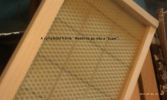
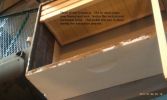
I added thumbnails, please click and open to view more details.
Here's hive 4, doing a random inspection: (notice the 1 super addition?)
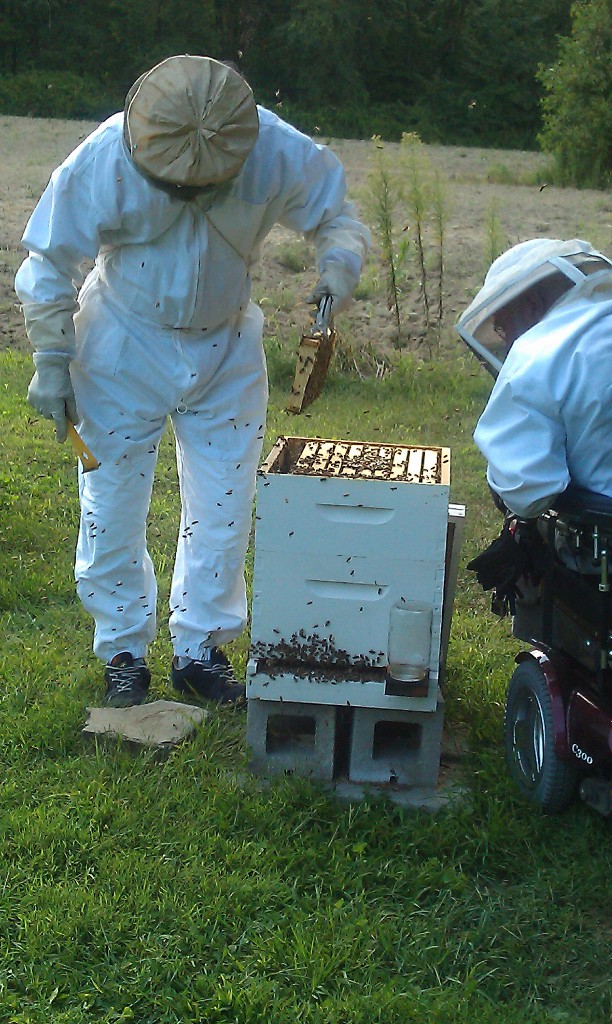
Here's hive 1, 3rd super half full of honey: (the unpainted wood divider above the first super is called a Queen Excluder. She can't get past it due to her size, to lay eggs in the upper supers, yet the workers can squeeze past and put honey in the comb. That's part of the yearly yield.)
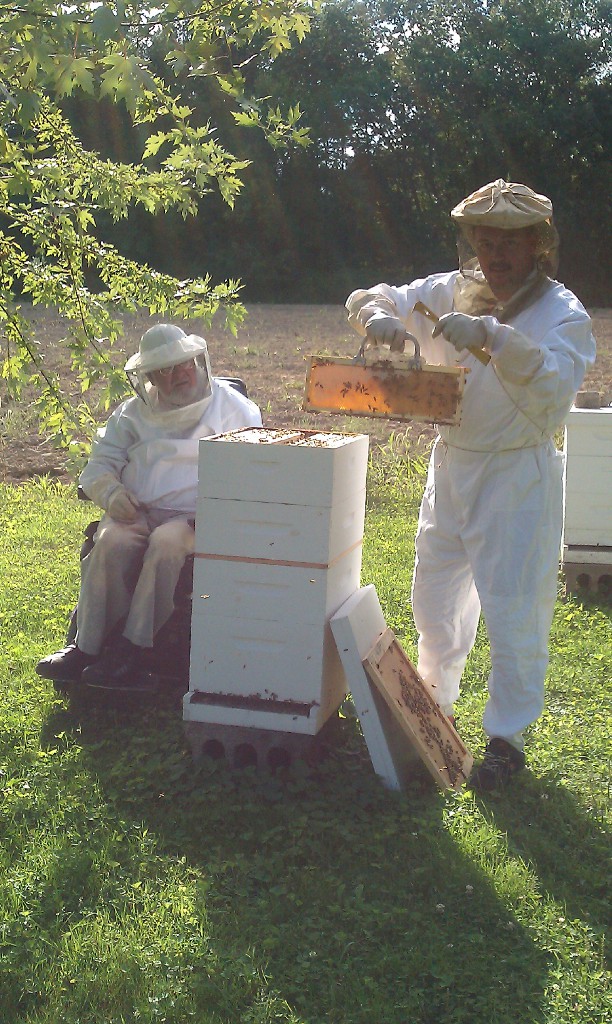
Adding a super to hive 1. Goldenrod came on, and Dad insisted, much to my groanings, that we add them before painting.

More hive maintenance: (notice the cart with three more supers to add?)
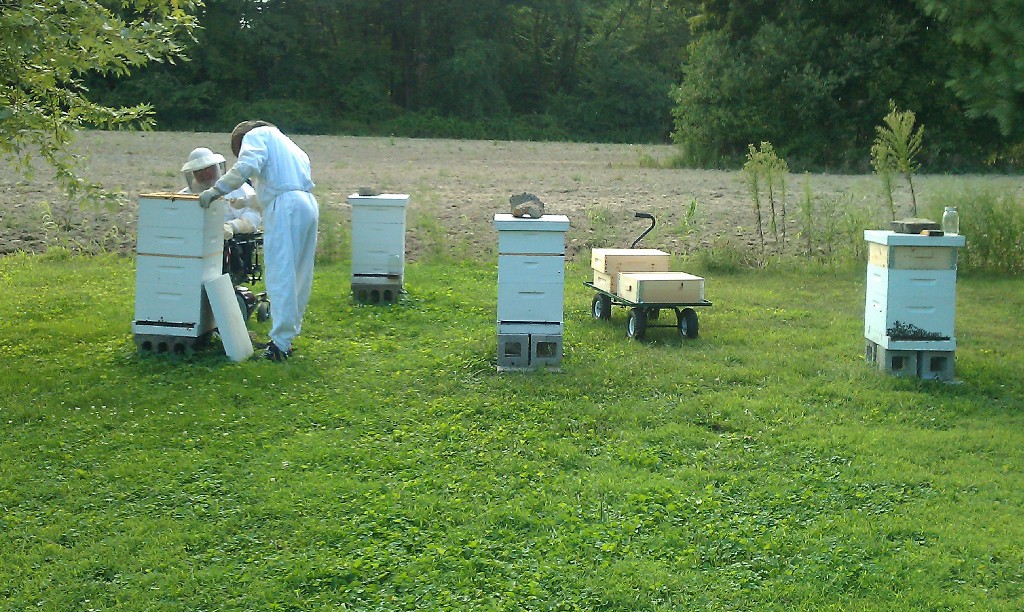
The current state of our hives:

We have two hives with Queen Excluders, with three supers above. At 30-50 US pounds per super, an estimate on yield is 180-300 lbs of honey. I was talking with my dear old Dad on the phone tonight, and he is estimating 230 US pounds of honey, having picked the brains of several other beekeepers he knows. We have to pull the supers this weekend, while the weather is nice, it's late in the year, and the weather is going to change. They factor in pollen flow, crop sizes, hive distances, etc, the crap I'll prolly learn when I am their age. Chuckle. I geek all that info on weather patterns on the interwebs. They are old school here-say and opinions. Gotta respect old school.
Yes, we are members of our local counties beekeeping association, and we stay up to date on all our bee news. The local bee inspector checks our hives twice a year.
Beekeeping is one way of ensuring our continuing survival.
The hive consists of three types of bees: The worker, the drone, and the Queen. The Queen controls the hive by pheromones. The drones are male, and their sole purpose is to mate with the Queen. Many drones will mate with the queen during her once a year mating flight, and if a drone mates with her, they soon die afterwards. Once inseminated, the Queen has enough eggs to lay for 2-3 years. Drones have no stingers, and if honey supplies run low, they are driven from the hive to starve. Useless males, argh!
The vital worker bee, female, of course, who does all the work:

The honeybees you see on flowers are always female. They collect pollen, eat it, and it goes into one of their special stomachs to be convert by enzymes into honey. They regurgitate the interim product into the mouth of another bee once back at the hive, who further processes it. That bee deposits it into a hexagonal comb, then caps it off once full.
When TSHTF, every community should have a few hives. This ensures local crop pollination, and provides a method of sweetening once supplies of sugar run out. I am planning ahead, and perhaps we can barter honey for other needed resources. If nothing else, I'll have a bunch of honey stockpiled, as it never spoils, and I already have a few friends willing to buy a few pounds off of this year's harvest. This year's harvest is estimated at 230 lbs, and we have to extract this weekend, so I'll be doing a follow-up thread depicting the extraction process.
A bit of background info: My father is a Vietnam War vet, a paraplegic due to his service, and his interest in beekeeping is a hobby of his as well. He has Multiple Sclerosis, and is confined to a wheel chair, so we both share advice and keep the hives running. He's 73, and still suits up to tend the bees, yet still catches an occasional bee to sting him, as he heard it was good for his MS.
We had three hives. Here's the video depicting the capture of hive 4, which is the hive furthermost to the rear now. Enjoy! (Note: Swarming bees are the most docile, as they have no hive to protect. My 15 year old daughter got really close to the bees, and never got stung. She's the voice in the video. It's when you threaten their hive that they get nasty.)

Here's the basics of a hive:

Here's the basic tools you need:

A note about smokers. I rarely use them. Smokers cause the bees to instinctively react to their hive being on fire, and they turn and start gorging themselves on honey. They don't bother you, because they are eating at their hive, but I honestly think that dealing with bees in the right humidity at the right time of day is more beneficial than "stressing" them out. Also, if you notice, beekeepers wear bright clothing, as lumpy dark shapes instinctively remind them of predators (bears, wolverines, etc.) I try to keep my bees as stress-free as possible.
Before you add bees, you need something for them to work upon. The frames.





I added thumbnails, please click and open to view more details.
Here's hive 4, doing a random inspection: (notice the 1 super addition?)

Here's hive 1, 3rd super half full of honey: (the unpainted wood divider above the first super is called a Queen Excluder. She can't get past it due to her size, to lay eggs in the upper supers, yet the workers can squeeze past and put honey in the comb. That's part of the yearly yield.)

Adding a super to hive 1. Goldenrod came on, and Dad insisted, much to my groanings, that we add them before painting.

More hive maintenance: (notice the cart with three more supers to add?)

The current state of our hives:

We have two hives with Queen Excluders, with three supers above. At 30-50 US pounds per super, an estimate on yield is 180-300 lbs of honey. I was talking with my dear old Dad on the phone tonight, and he is estimating 230 US pounds of honey, having picked the brains of several other beekeepers he knows. We have to pull the supers this weekend, while the weather is nice, it's late in the year, and the weather is going to change. They factor in pollen flow, crop sizes, hive distances, etc, the crap I'll prolly learn when I am their age. Chuckle. I geek all that info on weather patterns on the interwebs. They are old school here-say and opinions. Gotta respect old school.
Yes, we are members of our local counties beekeeping association, and we stay up to date on all our bee news. The local bee inspector checks our hives twice a year.
Beekeeping is one way of ensuring our continuing survival.
Pretty cool video watchin you and your family taking care of the bees by retrieving a swarm of bees and placing them in a new bee hive. Waiting on
seeing your next videos. We were the first to enjoy your YouTube video, and I subscribed.
Druid42
I appreciate your giving of your skills. I want to ask if you have problems with raccoons or other critters around your hives and how do you deal with them? Can hives be placed in the shade? I'm a newbie getting ready to do my part for the bees and the life giving food they produce for us humans.
I appreciate your giving of your skills. I want to ask if you have problems with raccoons or other critters around your hives and how do you deal with them? Can hives be placed in the shade? I'm a newbie getting ready to do my part for the bees and the life giving food they produce for us humans.
what good is your hive, when my marauding gang of indestructibles roam the post-apocalyptic earth salvaging any valuables and goods while leaving a
wake of destruction in our path. no offence.
edit on 4-10-2011 by randomname because: (no reason given)
Originally posted by electricalpup
Druid42
I appreciate your giving of your skills. I want to ask if you have problems with raccoons or other critters around your hives and how do you deal with them? Can hives be placed in the shade? I'm a newbie getting ready to do my part for the bees and the life giving food they produce for us humans.
I don't deal with the critters, the bees do. The female workers also protect the hive. If one gets killed, she emits a pheromone that alerts the other bees. A female worker bee dies when she stings something, when she's agitated. It's a cascade affect for any raccoon or other critter that happens by. They wind up running after so many bee stings. Critters are never a problem. However, if you have bears in your neighborhood, you may want to be cautious. Even still, a bear will get fed up and saunter away after being stung so many times.
Hives can be placed anywhere. When it's too hot, the worker bees will align themselves with the exit and fan their wings, keeping the hive cool. However, since bees are insects, they are cold-blooded, and most active when exposed to a heat source as the sun. As insects, they prefer open sunljght during the day. If possible, keep your hives in a sunny area.
Originally posted by randomname
what good is your hive, when my marauding gang of indestructibles roam the post-apocalyptic earth salvaging any valuables and goods while leaving a wake of destruction in our path. no offence.
edit on 4-10-2011 by randomname because: (no reason given)
None taken.
When TSHTF, there will be those of us who are prepared for it. What we don't have as individuals will be for us to barter what skills we do have for the betterment of all. I see people forming communities, and sharing with others, while each community has a set of guards, much like a beehive does, and if one of your marauding gang comes too close to our perimeter, you'll suffer the same consequence as does the wary critter around a beehive.
I see beehives being protected as much as any other resource. Good luck salvaging. It most likely will be your hide.
reply to post by Druid42
I really enjoyed your post. I have recently developed an interest in beekeeping, no hives yet. Perhaps I will get one next year. Been listening to a lot of pod casts on beekeeping, and farming, ya know got to get my skills up there for when the TSHTF.
I really enjoyed your post. I have recently developed an interest in beekeeping, no hives yet. Perhaps I will get one next year. Been listening to a lot of pod casts on beekeeping, and farming, ya know got to get my skills up there for when the TSHTF.
I have a number of questions
I have a tree in my yard that has a hive in it that i have been trying to trap swarms from it a couple years cardboard boxes with lemongrass oil for temporary trap boxes.
I can not damage the tree and they are deep in a hollow crack in the tree.
Where can i find a good site to identify the subspecies of bees these are they are darker and fuzzier then the one you show and i have never seen the subspecies around any commercial hives.
They are also very docile and non aggressive.
I have taken a bore scope and put it into the hole of the tree to see if i could see a part of the brood comb to remove for a trap out. I did this without any hood or protective gear and did not get stung.
I helped a old friend move his hives a couple times and harvest honey and he would have known just how to get this hive out and into a hive box as he had worked with bees for over 60 years. But he passed away back in 2004.
If i had a brood comb it would be no problem doing a trap out that is why i had been trying to trap a swarm.
Also where can i find a good set of plans for hive boxes and comb frames. its about a 450 mile round trip drive to the nearest bee keeper supply place to buy hive boxes.
And last have you had any problem with CCD out here in the desert i have not heard of any problems and know of a number of wild hives on peoples property, most i have seen were this same subspecies.
I have a tree in my yard that has a hive in it that i have been trying to trap swarms from it a couple years cardboard boxes with lemongrass oil for temporary trap boxes.
I can not damage the tree and they are deep in a hollow crack in the tree.
Where can i find a good site to identify the subspecies of bees these are they are darker and fuzzier then the one you show and i have never seen the subspecies around any commercial hives.
They are also very docile and non aggressive.
I have taken a bore scope and put it into the hole of the tree to see if i could see a part of the brood comb to remove for a trap out. I did this without any hood or protective gear and did not get stung.
I helped a old friend move his hives a couple times and harvest honey and he would have known just how to get this hive out and into a hive box as he had worked with bees for over 60 years. But he passed away back in 2004.
If i had a brood comb it would be no problem doing a trap out that is why i had been trying to trap a swarm.
Also where can i find a good set of plans for hive boxes and comb frames. its about a 450 mile round trip drive to the nearest bee keeper supply place to buy hive boxes.
And last have you had any problem with CCD out here in the desert i have not heard of any problems and know of a number of wild hives on peoples property, most i have seen were this same subspecies.
best. thread. ever.
Seriously, thanks, that was really informative and interesting. I loved it.
Seriously, thanks, that was really informative and interesting. I loved it.
reply to post by ANNED
No problems with CCD. Ever.
Plans are all over the internet, try this link. Hope you are handy with woodworking. Try googling bee hive plans for more info.
Please read up on trapping bees, Here, and Here. It's a rather lengthy process if you can't cut down the tree and get to the queen. There are several alternatives.....
And finally, can you post a pic of what your bees look like? That'll greatly help in identifying them.
No problems with CCD. Ever.
Plans are all over the internet, try this link. Hope you are handy with woodworking. Try googling bee hive plans for more info.
Please read up on trapping bees, Here, and Here. It's a rather lengthy process if you can't cut down the tree and get to the queen. There are several alternatives.....
And finally, can you post a pic of what your bees look like? That'll greatly help in identifying them.
edit on 10/5/11 by Druid42 because: added pic request
reply to post by Druid42
Very good thread!! Something I have wondered about for some time. I do have a co-worker who has Two hives himself. I own a small lot of land, I have a hillside that is somewhat forested. I plan to clear most of it this winter and replant with blackberries. This maybe a good place for a hive or two. I am trying to get out as much as I can with the little land I own. Love the video, great information.
Very good thread!! Something I have wondered about for some time. I do have a co-worker who has Two hives himself. I own a small lot of land, I have a hillside that is somewhat forested. I plan to clear most of it this winter and replant with blackberries. This maybe a good place for a hive or two. I am trying to get out as much as I can with the little land I own. Love the video, great information.
I just found out a class will begin at the end of the month for beekeeping so will definitely get info and attend.I was wanting to know what do the
inspectors check when they come onto your property and is it a surprise visit or appointment? I would have a problem with people around my hives.
reply to post by electricalpup
It's only one person, and they are certified by the state you live in. They check for mites, disease, overall bee counts, and answer any questions you may have.
Yes, they always send a postcard first, and they never show up un-announced. You can, however, call and schedule an appointment for one to come out and check your hives at any time if you have any worries. They are always very friendly and professional.
It's only one person, and they are certified by the state you live in. They check for mites, disease, overall bee counts, and answer any questions you may have.
Yes, they always send a postcard first, and they never show up un-announced. You can, however, call and schedule an appointment for one to come out and check your hives at any time if you have any worries. They are always very friendly and professional.
reply to post by Druid42
Thanks, are you going to add onto this thread when you harvest? I was wondering what do you do with the beeswax, and what is the average amount of wax from your hives?
Thanks, are you going to add onto this thread when you harvest? I was wondering what do you do with the beeswax, and what is the average amount of wax from your hives?
Originally posted by Druid42
reply to post by ANNED
No problems with CCD. Ever.
Thank you, I was going to ask that myself, I have been worried seeing the reports of that. I know how important these little guys and girls are to our survival and besides I LOVE honey as a sweetener.
Thank you again
reply to post by electricalpup
Interesting questions, and yes, you can make candles from old wax. BUT......
Here's the process: You only embed a thin sheet (maybe 1/8th inch thick) of wax, and the bees "draw out" the comb. They actually make wax and form it into perfect hexagons, building it up from that tiny 1/8th inch layer to about a half an inch on each side. You total wax becomes about an inch thick, with two sides to every frame.
After they "draw" the comb, they fill it with honey. Once it's filled, they "cap" it off, sealed with a thin layer of waxy sealant.
When you go to extract the honey, you simply cut the caps off, which are neatly just outside the edge of the frame, and the comb itself is not damaged. We use what called a "capping knife" two-edged, and plugs in, with a heating element inside to melt the caps as it cuts. You can just as easily do it with a sharp knife.
After extracting both sides of the frame, it is returned to the super that it came from. It gets placed near the hives so the bees can "clean" it out for a few days, then the super goes into storage, ready for use when the pollen flows again. They get added back to the hive, the bees re-fill it, you harvest it, etc. Once you have a completed super, it's good for several years. When the wax gets brittle, it time to rebuild your supers.
Yes, then you save ALL the old wax to make candles with. Best to blend with a bit of parafin, but that's a personal preference, and also a whole 'nother thread.
Interesting questions, and yes, you can make candles from old wax. BUT......
Here's the process: You only embed a thin sheet (maybe 1/8th inch thick) of wax, and the bees "draw out" the comb. They actually make wax and form it into perfect hexagons, building it up from that tiny 1/8th inch layer to about a half an inch on each side. You total wax becomes about an inch thick, with two sides to every frame.
After they "draw" the comb, they fill it with honey. Once it's filled, they "cap" it off, sealed with a thin layer of waxy sealant.
When you go to extract the honey, you simply cut the caps off, which are neatly just outside the edge of the frame, and the comb itself is not damaged. We use what called a "capping knife" two-edged, and plugs in, with a heating element inside to melt the caps as it cuts. You can just as easily do it with a sharp knife.
After extracting both sides of the frame, it is returned to the super that it came from. It gets placed near the hives so the bees can "clean" it out for a few days, then the super goes into storage, ready for use when the pollen flows again. They get added back to the hive, the bees re-fill it, you harvest it, etc. Once you have a completed super, it's good for several years. When the wax gets brittle, it time to rebuild your supers.
Yes, then you save ALL the old wax to make candles with. Best to blend with a bit of parafin, but that's a personal preference, and also a whole 'nother thread.
We are looking to extract THIS weekend, the supers are full, and the weather will be decent. This Saturday, probably. I have to put "bee escapes"
in tomorrow or Friday. Bee escapes go in an overboard between supers, and they are one way gates, the bees leave, and can't get back in. The super
is empty, and you are free to remove it and extract it.
Of course I will be shooting video and taking pics. I'll also post results of our honey harvest.
Of course I will be shooting video and taking pics. I'll also post results of our honey harvest.
reply to post by Druid42
Great, thanks for answering some of my questions.I want to be absolutely sure I know what I am doing. I would never want to cause harm to any living thing because of ignorance. I will think of more questions and will enjoy reading of your harvest.
Great, thanks for answering some of my questions.I want to be absolutely sure I know what I am doing. I would never want to cause harm to any living thing because of ignorance. I will think of more questions and will enjoy reading of your harvest.
Daily bee swarms?
During the dry season we see a swarm that leaves from behind the mountain around 9am, and then I assume the same swarm returns back over the mountain at 3pm, as we can see the black cloud and hear it twice a day.
I have always just assumed they were gathering pollen and water in a group.
I want bees we have lots around us all day, every day as we have gardens and they come to enjoy the resources.
But in this part of Arizona we have lots of African Bees, so we have several swarms stop by every year, so I fear I may collect the wrong swarm of aggressive. On days when aggressive bees come for resources we can tell as they warn you by ramming you in the forehead to back off. We go in or give those groups lots of space.We can not have the aggressive removed because we have no idea where they are we have miles and miles of empty desert in every direction.
Did not mean to ramble, we hear of bee shortages when we have thousands around us every day, so wanted to share, no shortage here.
During the dry season we see a swarm that leaves from behind the mountain around 9am, and then I assume the same swarm returns back over the mountain at 3pm, as we can see the black cloud and hear it twice a day.
I have always just assumed they were gathering pollen and water in a group.
I want bees we have lots around us all day, every day as we have gardens and they come to enjoy the resources.
But in this part of Arizona we have lots of African Bees, so we have several swarms stop by every year, so I fear I may collect the wrong swarm of aggressive. On days when aggressive bees come for resources we can tell as they warn you by ramming you in the forehead to back off. We go in or give those groups lots of space.We can not have the aggressive removed because we have no idea where they are we have miles and miles of empty desert in every direction.
Did not mean to ramble, we hear of bee shortages when we have thousands around us every day, so wanted to share, no shortage here.
new topics
-
This is our Story
General Entertainment: 2 hours ago -
President BIDEN Vows to Make Americans Pay More Federal Taxes in 2025 - Political Suicide.
2024 Elections: 4 hours ago -
Ode to Artemis
General Chit Chat: 5 hours ago -
Ditching physical money
History: 8 hours ago -
One Flame Throwing Robot Dog for Christmas Please!
Weaponry: 8 hours ago -
Don't take advantage of people just because it seems easy it will backfire
Rant: 9 hours ago -
VirginOfGrand says hello
Introductions: 10 hours ago -
Should Biden Replace Harris With AOC On the 2024 Democrat Ticket?
2024 Elections: 10 hours ago
top topics
-
University student disciplined after saying veganism is wrong and gender fluidity is stupid
Education and Media: 13 hours ago, 12 flags -
Police clash with St George’s Day protesters at central London rally
Social Issues and Civil Unrest: 16 hours ago, 9 flags -
President BIDEN Vows to Make Americans Pay More Federal Taxes in 2025 - Political Suicide.
2024 Elections: 4 hours ago, 9 flags -
TLDR post about ATS and why I love it and hope we all stay together somewhere
General Chit Chat: 17 hours ago, 7 flags -
Should Biden Replace Harris With AOC On the 2024 Democrat Ticket?
2024 Elections: 10 hours ago, 6 flags -
Don't take advantage of people just because it seems easy it will backfire
Rant: 9 hours ago, 4 flags -
One Flame Throwing Robot Dog for Christmas Please!
Weaponry: 8 hours ago, 4 flags -
God lived as a Devil Dog.
Short Stories: 14 hours ago, 3 flags -
Ditching physical money
History: 8 hours ago, 3 flags -
VirginOfGrand says hello
Introductions: 10 hours ago, 2 flags
active topics
-
One Flame Throwing Robot Dog for Christmas Please!
Weaponry • 7 • : OzBiker -
University student disciplined after saying veganism is wrong and gender fluidity is stupid
Education and Media • 26 • : DerBeobachter2 -
President BIDEN Vows to Make Americans Pay More Federal Taxes in 2025 - Political Suicide.
2024 Elections • 4 • : 727Sky -
British TV Presenter Refuses To Use Guest's Preferred Pronouns
Education and Media • 128 • : Consvoli -
Terrifying Encounters With The Black Eyed Kids
Paranormal Studies • 70 • : burritocat -
Tucker Carlson UFOs are piloted by spiritual entities with bases under the ocean and the ground
Aliens and UFOs • 42 • : Jukiodone -
The Fight for Election Integrity Continues -- Audits, Criminal Investigations, Legislative Reform
2024 Elections • 4143 • : Station27 -
-@TH3WH17ERABB17- -Q- ---TIME TO SHOW THE WORLD--- -Part- --44--
Dissecting Disinformation • 636 • : F2d5thCavv2 -
Russia Ukraine Update Thread - part 3
World War Three • 5719 • : F2d5thCavv2 -
Who guards the guards
US Political Madness • 5 • : 19Bones79
